- Home
- Tracy Chevalier
The Virgin Blue Page 9
The Virgin Blue Read online
Page 9
— What is your name?
— Paul.
— We're leaving. To Switzerland.
He nodded, his dark eyes calming her.
— Remember me.
He nodded again.
— Come, Isabelle, she heard Etienne whisper behind her. What are you doing there?
— Isabelle, Paul repeated softly. He smiled, his teeth bright with moonlight. Then he was gone.
— The house. The barn. Our bed. The big pig and her four babies. The bucket in the well. Mémé's brown shawl. My doll that Bertrand made for me. The Bible.
Marie was listing all the things they had lost. At first Isabelle couldn't hear her over the sound of the wheels. Then she understood.
— Hush! she cried.
Marie stopped. Or at least stopped saying them aloud: Isabelle could see her lips move.
She never referred to Jean.
Isabelle's stomach tightened when she thought of the Bible.
— Could it still be there? she asked Etienne softly. They had reached the River Lot at the bottom of the other side of Mont Lozère; Isabelle was helping Etienne guide the horse through the water.
— Hidden in that niche in the chimney, she added, it might have been protected from the fire. They would never have found it.
He glanced at her wearily.
— We have nothing left and Papa is dead, he replied. The Bible is no help now. It is not worth anything to us now.
But its words are worth everything, she thought. Isn't that why we are leaving, for those very words?
Sometimes when Isabelle rested in the cart, facing backwards out over the land they had covered, she thought she saw her father running along the road after them. She would squeeze her eyes shut for a moment; when she opened them he had disappeared. Occasionally a real person took his place, a woman standing by the road, men scything or raking or digging in the fields, a man riding an ass. All stood still and watched them pass.
Sometimes boys Jacob's age threw stones at them and Etienne had to keep Petit Jean from fighting back. Marie would stand at the very end of the cart, looking back at the strange boys. She was never hit by the rocks. Once Hannah was: it was only when Etienne turned to speak to her long after the boys were gone that he saw blood trickling down the side of her face from the top of her head. She continued to stare straight ahead as Isabelle leaned over to dab gently at the blood with a piece of dampened cloth.
Marie began listing everything she could see.
— There's a barn. And there's a crow. And there's a plough. And there's a dog. And there's a church needle. And there's a pile of hay on fire. And there's a fence. And there's a log. And there's an axe. And there's a tree. And there's a man in the tree.
Isabelle looked up when Marie stopped.
The man had been hanged from the branch of a small olive tree that could barely hold his weight. They stopped and stared at the body, naked but for a black hat rammed over his brow. His penis stood out stiffly like a branch. Then Isabelle saw the red hands, looked more closely at the face and drew in her breath sharply.
— It's Monsieur Marcel! she cried before she could stop herself.
Etienne clucked and began to run, pulling the horse with him, and they quickly left the vision behind, the boys glancing back several times until the body was out of sight.
For a few hours afterwards Marie was silent. When she began to list things once more, she avoided mentioning anything made by men. They reached a village and she simply repeated: — And there's the ground. And there's the ground — over and over until they had passed through.
They had halted at a stream to let the horse drink when an old man appeared on the opposite bank.
— Don't stop here, he said abruptly. Don't stop at all until you reach Vienne. It is very bad here. And don't go near St Etienne or Lyons. He disappeared into the woods.
They did not stop that night. The horse plodded on exhausted while Hannah and the children slept in the cart and Etienne and Isabelle took turns leading. They hid during the day in a pine forest. When it was dark Etienne hitched up the horse and led it back onto the road. A moment later a group of men emerged from the trees on either side and surrounded them.
Etienne halted the horse. One of the men lit a torch; Isabelle could see the axes and pitchforks among them. Etienne handed the horse's rope to Isabelle, reached into the cart and pulled out the axe. He set the head carefully on the ground and gripped the end of the handle.
Everyone stood motionless. Only Hannah's lips moved in a silent prayer.
The men seemed unsure how to begin. Isabelle stared at the one who held the torch, watching his Adam's apple dart up and down. Then she felt a tickling at her ear: Marie had moved to the side of the cart and was whispering something.
— What is it? Isabelle murmured, still looking at the man and trying not to move her lips.
— That man with the fire. Tell him about God. Tell him what God wants him to do.
— What does God want him to do?
— To be good and not to sin, she replied firmly. And tell him we are not staying here.
Isabelle licked her lips. Her mouth was dry.
— Monsieur, she began, addressing the man with the torch. Etienne and Hannah jerked their heads at the sound of her voice.
— Monsieur, we are on our way to Geneva. We are not stopping here. Please let us pass.
The men stamped their feet. A few chuckled. The man with the torch stopped swallowing.
— Why should we? he demanded.
— Because God does not want you to sin. Because murder is a sin.
She was shaking and could say nothing more. The man with the torch took a step forward and Isabelle saw the long hunting knife in his belt.
Then Marie spoke, the metal in her voice ringing out through the woods.
— Notre Père qui es aux cieux, ton nom soit sanctifié, she called out.
The man stopped.
— Ton règne vienne, ta volonté soit faite sur la terre comme au ciel.
A pause, then two voices continued.
Donne-nous aujourd'hui notre pain quotidien. Jacob's voice rattled like pebbles underfoot. Pardonne-nous nos péchés, comme aussi nous pardonnons ceux qui nous ont offencés.
Isabelle, taking a deep breath, added her voice to theirs.
—Et ne nous induis point dans la tentation, mais délivre-nous du malin; car à toi appartient le règne, la puissance, et la gloire à jamais. Amen.
The man with the torch stood between them and the group of men. He stared at Marie, the silence stronger than ever.
— If you hurt us, she said, God will hurt you. He will hurt you very very badly.
— And what will he do to us, ma petite? the man asked, amused.
— Hush, Marie! Isabelle whispered.
— He will throw you in the fire! And you won't die, not right away. You will lie in it and then your guts will begin to ooze and boil. And your eyes will get bigger and bigger until pop! They explode!
This was no lesson from Monsieur Marcel. Isabelle recognized the details: Petit Jean had thrown a frog into the fire once and the children had gathered around to watch its demise.
The man did something Isabelle never would have expected from such a man in such a place: he laughed.
— You are very brave, ma pauvre, he said to Marie, but a little foolish. I would like you to be my daughter.
Isabelle clutched Marie's hand and the man laughed again.
— But why would I want a girl? he chuckled. What use are they?
He jerked his head at the others and extinguished the torch. All of them disappeared into the woods.
They waited for a long time; no one returned. Finally Etienne clicked his tongue and the horse continued, more slowly than before.
In the morning Isabelle found the first strand of red in Marie's hair. She pulled it out and burned it.
4
THE SEARCH
Iran back to the office, clutching a postcard of
the Tournier painting. Rick was sitting on a high stool at his drawing board, a Tensor lamp picking out his cheekbones and the arrow of his jaw. Though he was staring at the sketch in front of him, his mind had clearly moved beyond the paper. He often sat for hours, visualizing in detail what he had just designed: fixtures, electrical systems, plumbing, windows, ventilation. He imagined the whole thing and held it in his head, walking through it, sitting in it, living in it, combing through it for faults.
I watched him, then stuffed the postcard in my bag and sat down, my elation ebbing. Suddenly I didn't want to share my discovery with him.
But I should tell him, I argued with myself. I will tell him.
Rick looked up from the board and smiled. ‘Hey there,’ he said.
‘Hey yourself. Everything OK? Structure sound?’
‘Structure sound so far. And good news.’ He waved a fax. ‘A German firm wants me to present to them in a week or two. If it comes off we'll get a huge contract. This office will be busy for years.’
‘Really? What a star you are!’ I smiled and let him talk on about it for a few minutes.
‘Listen, Rick,’ I began when he had finished, ‘I found something at a museum nearby. Look.’ I pulled out the card and handed it to him. He held it under the spotlight.
‘That's the blue you were telling me about, right?’
‘Yes.’ I stood behind him and wrapped my arms around his neck. He stiffened momentarily; I checked to make sure none of the psoriasis was touching his skin.
‘Guess who it's by?’ I rested my chin on his shoulder.
He started to turn the card over but I stopped him. ‘Guess.’
Rick chuckled. ‘C'mon, babe, you know I don't know anything about painting.’ He studied it. ‘One of those Italian Renaissance painters, I guess.’
‘Nope. He's French.’
‘Oh, well, one of your ancestors, then.’
‘Rick!’ I punched him on the arm. ‘You looked!’
‘No, I didn't! I was just joking.’ He turned the card over. ‘This really is one of your relatives?’
‘Yeah. Something makes me think so.’
‘That's great!’
‘It is, isn't it?’ I grinned at him. Rick slid an arm around my waist and kissed me while reaching around to unzip my dress. He had peeled it down to my waist before I realized he was serious. ‘Hang on a minute,’ I gasped. ‘Let's wait till we get home!’
He laughed and grabbed a stapler. ‘What, you don't like my stapler? How about my straight-edge?’ He twisted the Tensor spot so the light bounced off the ceiling. ‘My mood lighting doesn't turn you on?’
I kissed him and zipped up my dress. ‘It's not that. I just think we should – maybe this isn't a good time to talk about it, but I've been thinking I'm not so sure about the baby thing. Maybe we should wait a little longer before we try.’
He looked surprised. ‘But we made a decision.’ Rick liked to stick to decisions.
‘Yeah, but it's been more traumatic than I'd expected.’
‘Traumatic?’
‘Maybe that's too strong a word.’ Wait a minute, Ella, I thought, it has been traumatic. Why are you trying to shelter him from this?
Rick was waiting for me to say something else. When I didn't he sighed. ‘OK, Ella, if you feel that way.’ He began to gather up his drawing pens. ‘I don't want you going through with it unless you're sure.’
We drove home in a funny mood, both of us excited for different reasons, both chastened by my bad timing. We had just passed the square in Lisle when Rick stopped the car. ‘Hang on a second,’ he said. He jumped out and disappeared round the corner. When he returned a minute later he tossed something into my lap. I began to laugh. ‘You didn't,’ I said.
‘I did.’ He smiled mischievously. We'd often joked about the forlorn condom machine on one of the main streets and the kinds of emergencies that would make anyone use it.
That night we made love and slept soundly.
The day Jean-Paul returned from Paris I was so distracted at my French lesson that Madame Sentier began to tease me.
‘Vous êtes dans la lune,’ she taught me. In turn I taught her, ‘The light's on but nobody's home.’ It took some explaining, but once she got it she laughed and went on about my drôle American humour.
‘I never know what you will say next,’ she said. ‘But at least your accent is improving.’
Finally she dismissed me, assigning extra homework to make up for the wasted lesson.
I hurried to catch the train back to Lisle. When I got to the square and looked across at the hôtel de ville, though, I was suddenly reluctant to see him, like the feeling you get when throwing a party and an hour before the guests arrive you want to back out of it. I made myself walk across the square, enter the building, climb the stairs, open the door.
Several people were waiting for help from the two librarians. They both looked up, and Jean-Paul nodded politely. I sat down at a desk, disconcerted. I hadn't expected to have to wait, to tell him with so many people around. I began working on Madame Sentier's assignment halfheartedly.
After fifteen minutes the library cleared a little and Jean-Paul came over. ‘May I help you, Madame?’ he asked quietly in English, leaning over, one hand on my desk. I'd never been so close to him and as I looked up, caught the particular smell of him, of sun on skin, and stared at his jaw line peppered with stubble, I thought, Oh no. No, not this. This is not what I came here for. A quivery panic rose in my stomach.
I shook myself and whispered, ‘Yes, Jean-Paul, I have –’ A slight movement of his head stopped me. ‘Yes, Monsieur,’ I corrected myself. ‘I have something to show you.’ I gave him the postcard. He glanced at it, turned it over and nodded. ‘Ah, the Musée des Augustins. You saw the Romanesque sculpture, yes?’
‘No, no, look at the name! The name of the painter!’
He read aloud in a low voice, ‘Nicolas Tournier, 1590 to 1639.’ He looked at me and smiled.
‘Look at the blue,’ I whispered, touching the card. ‘It's that blue. And you know the dream I told you about? I figured out even before I saw this that I was dreaming of a dress. A blue dress. That blue.’
‘Ah, the blue of the Renaissance. You know there is lapis lazuli in this blue. It was so expensive they could only use it for important things like the Virgin's robe.’
Always a lecture ready.
‘Don't you see? He's my ancestor!’
Jean-Paul glanced around, shifted on the desk, looked at the card again.
‘Why do you think this painter is your ancestor?’
‘Because of the name, obviously, and the dates, but mostly because of the blue. It matches perfectly with the dream. Not just the colour itself, but the feeling around it. That look on her face.’
‘You did not see this painting before you had the dream?’
‘No.’
‘But your family was in Switzerland by that time. This Tournier is French, yes?’
‘Yes, but he was born in Montbéliard. I checked, and guess where that is? Thirty miles from Moutier! Just inside the French border. His parents could easily have moved from Moutier to Montbéliard.’
‘There was no information about his family?’
‘No, there wasn't much about him at the museum, just that he was born in Montbéliard in 1590, spent some time in Rome, then came to Toulouse and died in 1639. That's all they know.’
Jean-Paul tapped the postcard against his knuckles. ‘If they know his birth date they will know his parents’ names. Birth and baptism records always list the parents.’
I gripped the table. Rick's response was so different from this, I thought.
‘I will look for information about him for you.’ He stood up and handed me the postcard.
‘No, I don't want you to,’ I said loudly. Several people looked up and the other librarian frowned at us.
Jean-Paul raised his eyebrows.
‘Monsieur, I will do it. I will find out about him.’
‘I see. Very well, Madame.’ He bowed slightly and walked away, leaving me feeling shaky and deflated. ‘Damn him,’ I muttered, staring at the Virgin. ‘Damn him!’
Jean-Paul's scepticism affected me more than I wanted to admit. When I discovered the painter it didn't occur to me to find out more about him. I knew who he was; my gut feeling was all the proof I needed. Names and dates and places would make no difference to that certainty. Or so I thought.

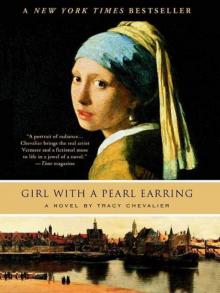 Girl With a Pearl Earring
Girl With a Pearl Earring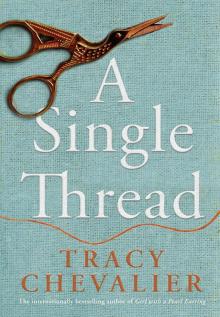 A Single Thread
A Single Thread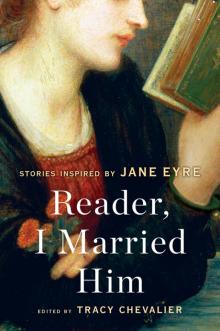 Reader, I Married Him: Stories Inspired by Jane Eyre
Reader, I Married Him: Stories Inspired by Jane Eyre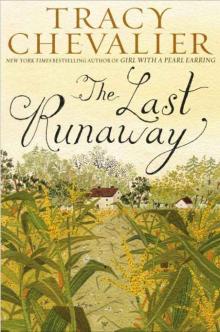 The Last Runaway
The Last Runaway Burning Bright
Burning Bright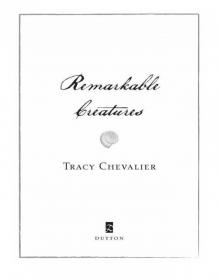 Remarkable Creatures
Remarkable Creatures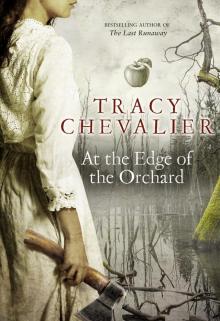 At the Edge of the Orchard
At the Edge of the Orchard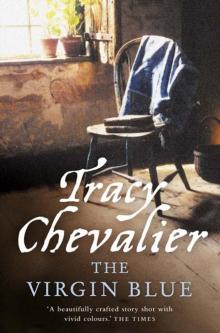 The Virgin Blue
The Virgin Blue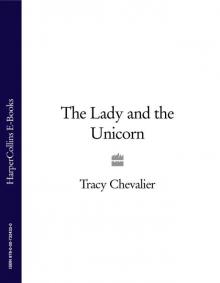 The Lady and the Unicorn
The Lady and the Unicorn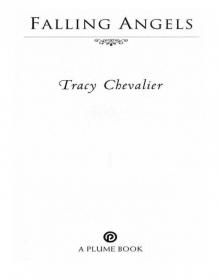 Falling Angels
Falling Angels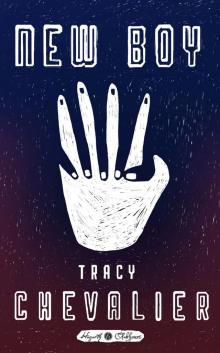 New Boy
New Boy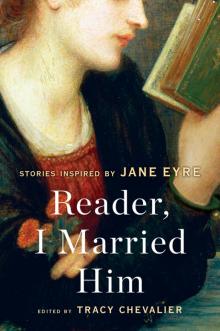 Reader, I Married Him
Reader, I Married Him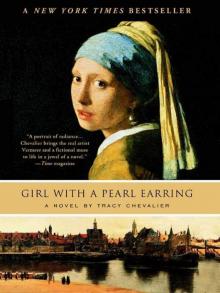 Girl with a Pearl Earring, The
Girl with a Pearl Earring, The